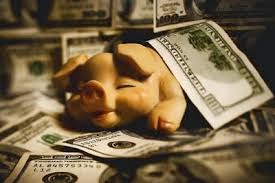Money Sleeps For Ever!!!
“Greed is good” ~ Wall Street. Three words that are arguably the finest epitaph for the era of excess that began in the 1980s, excessive greed compounded even further and finally culminated in the most serious economic crisis in 2008 impairing the whole economy. “Madness is badness of spirit, when one seeks profit from all sources” - Aristotle. We have the new nomenclature as coined famously by British media "Casino Banking" quite evidently instrumental for high growth across business verticals, multiplying money over a century now. Greed probably closely echoes the inherent driving spirit of the industry. However the exposure is now unlimited and stakes are quite high, financial crisis are driving the economy to nothing but a double deep recession. The unraveling facts yet to appear in public domain might potentially bring in new surprises in the crises laden economy.
“How much is enough” ~Money Never Sleeps, sums up the important message to the underlying problem. After the Financial crisis of 2008, there was a hue and cry all over the globe about the functioning, administration and regulation of Financial Institutes. The most impacted are the banks which as per me form the most regulated sector in the industry. In an industry where a bank operates with a capital of 2% to manage £1 trillion asset/public money this becomes more imperative to censure the fooling around in the way of making money. We all have heard about the BASELIII, ICB, Dodd-Frank, SOX compliance, various stress tests and other global and local regulations coming into force like never before. Another result was a fire sale of assets to boost balance sheets. The banks were desperate to raise capital and shrink their balance sheets, often under orders from regulators. Banks now need to assess the impact of revised regime and their ability to track leverage ratio (exposure/capital), liquidity coverage ratio, large exposures, regulatory capital, risk management etc.
To add to Bankers woes, ICB now has brought in the reforms to ring-fence retail banking operations from their “casino” investment banking business. Capital ratios requirements are further raised. There is a tremendous pressure on banks by banking supervisors, central banks and finance ministries. The tighter the regulatory framework, the more likely the rules will be different from country to country, which would drastically raise the fixed costs of an international strategy, given that a number of the big players are global. These regulations are further viewed as obstacle to cross-border mergers and acquisitions by certain market participants.
The tight regulations still cannot compensate for inadequate supervision by regulators and poor decisions and rogue trades by bankers. We are in a global market and tight local regulations would mean there is no level playing field in cross border sectors/operations. Having said this, I completely endorse the BASEL III norms and banks across the globe should adopt and adhere to these guidelines, sooner the better .In a way, there would be a single set of regulations for all competitive entities. Regulators must understand that too many, or too complex rules are completely unnecessary and unwanted. By prescribing overdose of sleeping peel the regulators might be scripting for Hollywood sequel to Michael Douglas starrer 'Money Sleeps For Ever'. Nevertheless, these steps underscore the intention behind and the coherent message in order to build a robust industry. To conclude my view is to find the right balance to enhance the efficiency of a Bank, ensuring accountability and effectiveness of banking sector as a whole.
Co-Authored by Kartar Singh Parmar, written almost 18 months ago on the contemporary conditions in banking sector.




Comments
Post a Comment